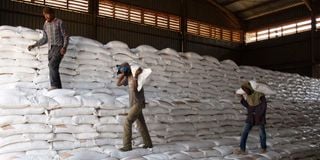Premium
Subsidised fertiliser too costly, farmers say

Workers arrange bags of subsidised fertiliser at the National Cereals and Produce Board depot in Elburgon, Nakuru County, on February 21, 2023.
Farmers in maize growing zones in Rift Valley have questioned the efficiency of the government-subsidised fertiliser, saying they have to mix it with other brands or buy twice the average amount, which is costly in the long run and beats the purpose of the programme.
They claim the low-cost fertiliser distributed through the National Cereals and Produce Board (NCPB) and Kenya National Trading Corporation (KNTC) outlets lacks the nutrients meant to improve soil health, forcing them to blend it with other types of fertiliser.
The farmers say the subsidy programme will be expensive because they have to apply two bags of the blended NPK 23:23 fertilisers per acre, unlike the DAP brand which only required one or one and a half bags.
The government-subsidised NPK fertiliser sells at Sh3,500, Yara variety at Sh4,050 while DAP and other brands are retailing at Sh5,600 per 50-kilogram bag.
“What the government prioritised is quantity rather than quality. Ideally, the government should have carried out soil testing to determine the type of fertiliser that is suitable for each region instead of distributing the same brand across the board, which may turn out to be expensive to farmers,” said Kimutai Kolum, a large scale farmer in Uasin Gishu.
Interviewed farmers said they have to purchase extra bags of the subsidised fertiliser, implying they incur Sh7,000 for the two bags of the 50 Kg NPK 23:23 brand, which is costly.
The sentiments by the farmers are echoed by experts in the agriculture sector who confirm that the NPK 23:23 brand has lower nutrient content compared to crop-specific brands.
Potassium
According to Dr Timothy Njagi of Tegemeo Institute, the NPK 23:23 contains 46 per cent of nitrogen, phosphorus and potassium compared to other brands.
“Because of the lower nutrient levels, farmers have to apply an extra bag compared to DAP to achieve higher fertilisation,” said Dr Njagi.
He adds that the ministry ought to work with farmers to avail lime to address soil acidity and nutrient deficiencies.
“Some fertilisers like DAP are not bad, but farmers need to know how to use them. For instance, they need to apply the fertiliser together with lime, which is a byproduct of cement,” said Dr Njagi.
“We also need to support innovations because there are innovators who have developed lime spreaders as opposed to imported granulated lime fertilisers, which are more expensive.”
The country requires about 650,000 tonnes of fertiliser annually but some farmers have to plant crops without applying the nutrients due to high prices.
Farmers in the region will now be forced to buy expensive fertiliser from private dealers, as the subsidised ones are not enough.
Already, private dealers are cashing in on the lack of enough affordable fertiliser, and are sending text messages to farmers, claiming the fertiliser is available in their shops.
A report by National Accepted Agriculture Input Access (NAAIA) in collaboration with the Kenya Agricultural and Livestock Research Organisation (KALRO) discourages the application of DAP fertiliser in maize growing zones of Uasin Gishu, Trans-Nzoia, Nandi and Elgeyo Marakwet counties.
The soil acidity level (PH) in the region ranges from five to seven, and farmers are recommended to apply compost or animal manure during planting to control the acidity level.
They need to apply Calcium Ammonium Phosphate (CAN) for top dressing to improve crop production.
It costs farmers between Sh1,500 and Sh2,000 to carry out sampling to determine the acidity level of the soil.
Reporting by Barnabas Bii, Stanley Kimuge, Eric Matara and Steve Njuguna





